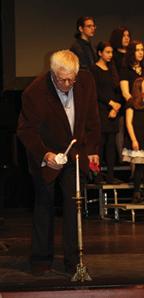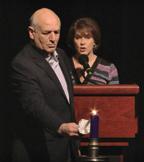That’s how I heard someone describe the SevenDays Make a Ripple, Change the World series of events that began Tuesday, April 10, and concluded Monday night with the fourth-annual Faith, Love & Walk at the National World War I Museum and Memorial.
It’s been four years since the senseless murders of Dr. William Corporon, his grandson, Reat Underwood, and Terri LaManno by a neo-Nazi who set out to kill Jews. A year later I watched with awe as SevenDays was launched, largely through the efforts of Mindy Corporon, who lost her father and son on that horrible day. The SevenDays events are an effort to embrace diversity across races, religions and cultures.
This year, SevenDays occurred at the same time as Yom HaShoah, a time when we remember the victims, and celebrate the survivors, of the Holocaust. By some weird twist of fate, a SevenDays event had a Holocaust theme. Learning about hatred, bigotry and how to overcome these things played a big role in my activities last week.
It began with Day One of SevenDays: Love, which featured an evangelical pastor, an imam and a rabbi (Rabbi Arthur Nemitoff) and was hosted by The Temple, Congregation B’nai Jehudah. Both the pastor and the imam believe there will be more love in this world if we all get to know one another better. The pastor’s path to what he calls multi-faith relations began as a child after his elementary school in Texas was integrated. He befriended the black boy in his class after others weren’t allowed to sit by him.

One thing he said that I really latched on to was, “We should not have to give up our faith to like each other.” He made suggestions on how we can get to know one another better, something several organizations here are making great strides toward.
“Love they neighbor,” was another theme that night. The imam, who came to this country to escape the horrors of the Sudan, preaches that if we practice loving they neighbor, then “we will solve so many problems in the world.”
As a preliminary judge for the Midwest Center for Holocaust Education’s annual White Rose Essay Contest, I learned new things about how the Nazis treated several other groups of people during the Holocaust.

The workweek ended with another SevenDays event. This one was a Shabbat luncheon at Congregation Beth Torah. It featured Yvette Manessis Corporon, cousin to Bill Corporon and Reat Underwood, who wrote “Something Beautiful Happened,” a true story about a small group of people hiding Jews on a tiny Greek island.
The room at Congregation Beth Torah was filled to capacity. As a friend wrote on Facebook, “Her story was heartwarming and amazing, and I feel so lucky to have gotten to hear her speak. I purchased the book and can’t wait to read it.” While the theme of the day was connect, the lesson of the day was to continue to learn these stories of these righteous gentiles, and our own survivors, as now more than ever it’s important to “Never Forget.”
That is oh so important as we discovered this week that many Americans were unaware of basic facts about the Holocaust. (See full story page 23.) Now’s a good time to plug the importance of the Midwest Center for Holocaust Education and its mission to teach the history of the Holocaust and apply its lessons to counter indifference, intolerance and genocide.
And then there was the annual Yom HaShoah Community Holocaust Commemoration on Sunday, an event I make a point not to miss. Why? As Rabbi Nemitoff quoted George Santayana, “Those who cannot remember the past are condemned to repeat it.”
Rosanne Rosen, this year’s chair, spoke eloquently about her father, Alfred Kohlman of blessed memory, and how he didn’t consider himself a survivor for many, many years because he was able to leave Germany and come to the United States. Those who were left behind — his parents, his uncle and others — suffered a different fate. It struck me one of her father’s favorite sayings was a theme for the week: “Always stand up against hatred and bigotry and do what you can for the less fortunate.”
Every year at the Holocaust Commemoration, six candles are lit in in memory of the 6 million Jews who perished. This year a seventh candle was lit in recognition of 70 years of Israeli statehood. It reminded me that while Yom HaShoah is an inherently sad day, in just a few days we would be celebrating the 70th anniversary of the birth of Israel. Whether it’s fact or not, many think that the Holocaust triggered the effort toward statehood, because only a Jewish state might again avoid the horrors of the 1940s.
So, on the surface it may seem that the common thread tying together everything I did during the week was hate. But maybe, just maybe, the common thread was expressed by Yvette Manessis Corporon when she said, “We will not let hate have the last word.” I’m guessing that’s what Mindy Corporon hopes every year as she, along with Terri’s husband, Jim LaManno, and their group of loving volunteers, begin planning SevenDays. I’m guessing that’s what the people were thinking who gathered to shield a mosque in Washington, D.C., from those who wanted to destroy it after 9/11. And I know in my heart it’s the basis of “Never Again.”